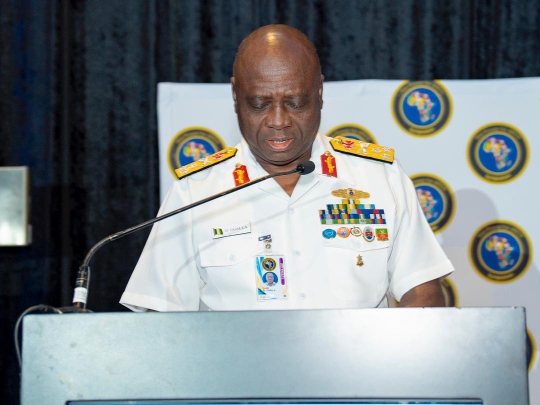The Chief of the Naval Staff (CNS), Vice Adm. Emmanuel Ogalla, has said the vast resources within Africa’s maritime domain have the potentials of generating over 405 billion Dollars by 2030.
Ogalla made this known in a keynote address at the just concluded 5th Sea Power for Africa Symposium (SPAS) with the theme, “Good Order at Sea in the African Maritime Domain”, held in Cape Town, South Africa.
This is contained in a statement by the Director, Navy Information, Commodore Aiwuyor Adams-Aliu, on Friday in Abuja.
The CNS added that the continent’s maritime domain could also generate 100 million from coastal tourism, with the capacity to create over 57 million jobs across the continent.
He said that the sustainable management of these resources was crucial, adding that they were key drivers of economic growth and food security.
Ogalla emphasised that Africa’s maritime future was guided by the African Integrated Maritime Strategy (AIMS), which aims to foster wealth creation by developing an ocean economy within a secured maritime domain.
This vision, according to him, is further supported by the African Continental Free Trade Agreement (AfCFTA), which is projected to increase intra-African freight by 28 per cent and demand for maritime transport by 62 per cent.
Ogalla said that with a significant portion of global trade passing through African waters, maritime activities currently contributed more than 20 per cent of national revenues for some African countries.
“However, the richness of these waters and the intense economic activities within them expose our maritime domain to a range of non-traditional threats, posing significant challenges to regional stability,” he said.
He said that addressing the challenges required a united effort, urging African navies and coast guards to strengthen security architecture across the continent.
The Naval chief said the nation remained a key player in the fight against maritime crime with an extensive maritime domain that includes the Gulf of Guinea.
He noted that the Nigerian Navy was implementing a Total Spectrum Maritime Strategy, incorporating a “Trinity-of-Action” approach that combines surveillance, rapid response and law enforcement.
These strategies, he said, contributed to the removal of Nigeria from the list of piracy-prone countries in March 2022, a status the country had maintained.
Ogalla highlighted the border incentives for maritime security cooperation, noting that securing African waters would facilitate increased trade, attract tourism and foster economic growth and prosperity.
According to him, African navies must take decisive action to prevent oil spills, reduce waste dumping, and ensure sustainable fisheries management to secure long-term food security.
“Ultimately, the security of our maritime borders is essential for regional stability and the achievement of our national objectives.
“The 5th Seapower Symposium for Africa opened new frontiers for effective protection and use of the sea via collective agenda by African states and Nigeria’s participation was highly significant,” he said. (NAN)










Got a Questions?
Find us on Socials or Contact us and we’ll get back to you as soon as possible.